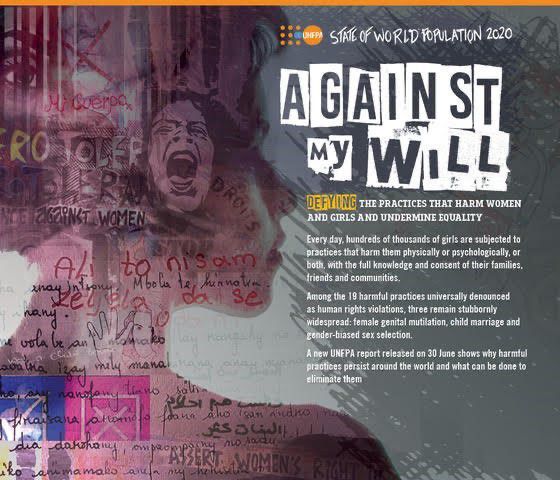CORTH Blog: 3 July 2020
This week Maya Unnithan, director of CORTH was invited as one of four panellists to comment on the UNFPA State of World Population Report 2020, UK launch event, organised by Matt Jackson (UNFPA UK director), Tuesday 30 June 3:00-4:30pm (BST)

The report, Against My Will: Defying the Practices that Harm Women and Girls and Undermine Equality, released on 30 June, focuses on the scale, prevalence and redressal of three silent, endemic practices of gender discrimination and stereotyping: gender-biased sex selection, Female Genital Cutting and child marriage. The report explores why such harmful practices persist around the world and what can be done to defy them.
“At its core this powerful report puts a spotlight on the silent endemic processes which cause harm to millions of women and girls globally. The three harmful practices of son preference, Female Genital Cutting and child marriage are identified as acute, current practices causing suffering and often irreversible damage to the prospects of life, education, livelihood, equality and rights specially of women and girls across the world. In the report harm is conceptualised as more than injury and a cause of suffering that is beyond statistics and immeasurable.
Two pioneering contributions of the report are first, its deep understanding of harm as embedded within systemic processes of discrimination and gender stereotyping. And, second, demonstrating how such harms are intrinsically connected to human rights violations.
To take the example of son preference deep harm is manifest in terms of the low value attributed to girls and women compared to men and boys in patriarchal societies which manifests in poor access to food, money, inheritance, property, healthcare impeding the growth of girls and severely restricting their survival and well-being. This is the process of postnatal selection that demonstrates the consequences of being born a girl, of being unwanted. The gender discrimination in son preference also drives prenatal sex selection and female selective abortion where girls are erased altogether. Such processes as the report highlights result in a complex cascade of harms from demographically skewed sex ratios at birth in favour of boys to violence against women who give birth to girls.
Son preference is a human rights violation as it goes against the principles of gender equality and non-discrimination. When manifest as prenatal sex selection it involves a deliberate prevention of female births. The entitlements that son preference confers to men within patriarchal systems over women’s bodies is a violation of bodily autonomy and the feminist, ethical principle of bodily integrity.
How do we best take forward the nuances, qualitative and quantitative evidence and stories of success provided in this report to defeat such harmful practices? Strengthening legal systems is essential and as the example of the Republic of South Korea in the report highlights laws that have upheld employment and inheritance rights for women have resulted in declining levels of gender-biased sex selection against girls. But legal measures alone are not sufficient. Bans on the practice of sex selection have not had an effect as we have seen in the rise in skewed sex ratios at birth in favour of boys in India, for example, despite criminalisation of its practice. Additionally, a ban can infringe on women’s other reproductive rights such as their access to abortion. Bans also do not address the entrenched ideological roots of discrimination wherein harm is often practised by women themselves who believe in male superiority but also undertake sex selection as a protective measure against the patriarchal discrimination of their daughters. Private sector doctors ostensibly offer sex selection services to help women, as one doctor put it to me, to fulfil their bodily rights. This results in collusion which evades legal prosecution.
Although rights have arrived, as one of my research respondents in India suggested, justice has not followed. To deliver justice a greater everyday challenge has to be mounted against the ideas, moralities, perceptions and practices that uphold gender discrimination within households, schools, health-centres, planning and policy offices and academia. Men as the report highlights as husbands, fathers, policymakers, healthcare providers need to use their privilege to redress gender discrimination for greater social justice.”
